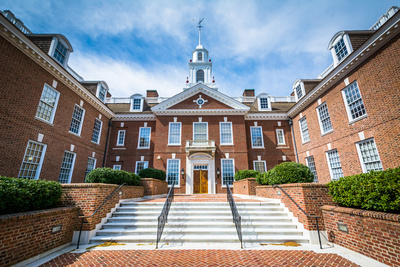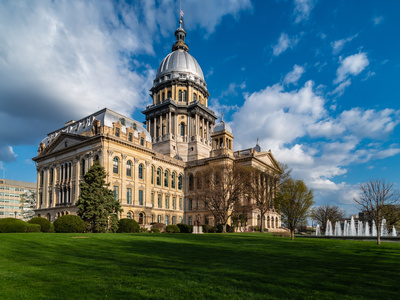Coming into the legislative season, we thought that taxation of services would be a central issue before state legislatures this year, and we were right. Governors and legislators alike have called for expanding the tax base, either by eliminating existing exemptions, enumerating specific services to be taxed or broadly taxing all sales - whether tangible personal property or services.
Given the significant economic, tax policy and political hurdles to expanding the sale tax base, the most serious proposals come from governor's offices. Here are the big ones that we are following:
- During his State of the Commonwealth address, Kentucky Governor Bevin (R) said that he wanted to start move his state towards a taxation model that relied more consumption taxes, rather than income taxes. “[Some tax policies] are going to be returned to the barn as sacred cows, and some of them are going to be turned into hamburger,” he said. While he did not offer a specifics about this plan, we are expecting his ultimate plan to include an expansion of the sales tax base to include some number of services.
- Specifics are still scarce, but Maine Governor LePage (R) is pursuing, despite legislative criticism, a plan to cut the personal income tax rate and expand the sales tax base. He has been arguing that these reforms are necessary to mitigate the harm done by the passage of a pair of citizen initiatives last November that raised the minimum wage and levied a higher tax on households with more than $200,000 in income.
- In an effort to resolve her state's $878 million budget deficit, Oklahoma Governor Fallin (R) has prepared a sweeping tax plan that calls for eliminating the corporate income tax, increasing the tobacco tax, and an expanding the sales tax base to include 164 new services, including legal, accounting, real estate, software design. Despite her plan's income tax cut, Republican legislators have expressed their disapproval for the governor's proposal, calling it a $1.7 billion tax increase on Oklahoma small businesses and entrepreneurs.
- Pennsylvania Governor Wolf's (D) executive budget proposal would expand the sales tax to include a set of enumerated services, including business storage, aircraft maintenance, and software and computer services. The governor is billing these changes—along with several other tax provisions—as “closing loopholes” while protecting middle class taxpayers from broad based tax increases.
- As a part of his budget proposal, West Virginia Governor Justice (D) is calling for an expansion of the sales tax to include services, along with the imposition of a gross receipt tax, a higher sales tax rate, a soda tax, and higher levies for alcohol and tobacco. The governor had discussed a more aggressive tax plan during his State of the State address, but this week he responded to widespread criticism by legislators and scaled back some of his tax increases. On the taxation of service front, however, the only notable change was the fact that the governor says he will no longer propose taxing advertising services under his new plan.
Beyond these governor-led taxation of services measures, legislator have have also introduced a few noteworthy proposals to tax services. A West Virginia bill would eliminate the state's current sales, personal income, and corporate income taxes and replace them with a “general consumption tax” that would include almost no exemptions or exclusions. A series of Nebraska bills would by turns expand the sales tax to include several new service categories, including repair, personal care, and professional services. Finally the so-called grand budget bargain proposed by the Illinois Senate has called for taxing laundry, storage services, and amusement admissions.
These kinds of bills have not found particular legislative success in the past, but given the sheer number of proposals on deck this year, it's certainly possible that this is the year that breaks the mold.
Kansas legislators fail to repeal Governor Brownback's Marquee Tax Cuts
Kansas has been experiencing systemic revenue difficulties for the past several years, with estimates indicating a gap of $346 million for the current fiscal year and over $1 billion for the coming biennium. In the face of these challenges, a growing number of lawmakers have sought to alleviate the state's fiscal imbalance by repealing the state's exemption on pass-through business income, which the legislature and Governor Brownback (R) enacted five years ago. This year lawmakers
introduced a proposal to repeal the exemption, impose a third personal income tax bracket, and increase the rate for the new middle bracket.
While repealing the pass-through exemption was originally championed by Democratic lawmakers, this year's tax package saw a marked increase in GOP support, leading to such a proposal passing the House and Senate by votes of 76-48 and 22-18, respectively. Decrying the bill as a “
big, retroactive income tax increase”, Brownback vetoed the measure and the bill's sponsors ultimately proved unable to marshal the necessary votes in the Senate to overturn him.
Despite the bill's failure, lawmakers are confident that the issue will come up again later this session. In the mean time, legislators will again consider the governor's budget balancing package, which calls for
hiking tax rates on alcohol and tobacco.
Louisiana passes midyear budget deal without tax changes
Last year
Louisiana lawmakers endured a grueling series of fiscal special sessions and passed a number of controversial new revenue raisers in order to balance the state's budget. Faced with a budget gap in excess of
$300 million for the current budget year, Governor Edwards (D) convened a special session earlier this month to find a solution. While there was a
considerable back and forth about how much of the rainy day fund the state should tap into, legislators were ultimately able to reach and agreement that did not include any significant tax changes. Work now turns to how to close the
$404 million deficit in the coming fiscal year; thus far the governor's proposal again looks for balance
only through spending cuts.
Virginia finishes low-key legislative session with balanced budget
Late last year
Virginia Governor McAuliffe (D) was predicting of a bitter budget fight in the face of a
$1.5 billion budget shortfall, but following better than expected revenue reports this year the
deficit fell significantly. This allowed lawmakers to move
relatively easily through this year's legislative session, balancing the state's books, enacting a pay raise for public school teachers, and passing a
measure to expand the state's sales tax nexus to those businesses that keep inventory in the state.
Combined reporting falling out of fashion?
Perhaps because of the prospect of federal corporate income tax reform or because of a general waning in interest in the policy, fewer states seem to be entertaining mandatory unitary combined reporting (MUCR) legislation this year. Thus far the the vast majority of bills that would mandate MUCR have been from Democratic legislators in Republican-controlled legislative chambers, meaning that their chances of passing are nearly non-existent.
There are two exceptions. Maryland has introduced an MUCR
bill, but this is a perennial topic of debate in that state and there's no particular reason to believe this year's iteration will fair any better than past efforts. A
Pennsylvania's
proposal, while from a blue lawmaker in a red legislature, could get a extra push given that Governor Wolf (D) has included combined reporting in his executive fiscal plan.
It's also worth noting that Julie Prendergast Magee, the
Alabama Revenue Commissioner, recently took to
LinkedIn to support combined reporting, saying that it levels the playing field for her state's small businesses.
None of this is to say that we might not see more of these proposals in the future, only that legislative interest in the topic seems to be dampened this year.
-000055-400px.jpeg)
-000055-400px.jpeg)

